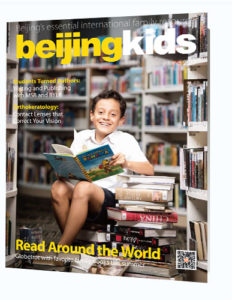It’s Thursday afternoon and we are sitting together with my daughter’s new library book on my knees. My son, Paz, is on my right and Echo is doing somersaults off the couch to my left. I’m only on the second page.
“Why aren’t you listening to Mommy reading?” I ask her, irritated.
“Because.” she says, as if this 5-year-old answer is adequate.
I can already determine that the book she has chosen is not what she expected. It’s a complex story about Santa and a hibernating dormouse. There are too many words for her age level. Oh, and it’s in French.
Echo goes to the French International School. When she began at age 3, she only had our brief visits to Montreal in which to frame the language. I speak French with her Quebecoise godmother (my best friend), but at home I have actively chosen to focus on English considering my minority status within our predominately Chinese household. Now, after two years of French school, she understands a lot more than she speaks, but it’s still her weakest language.
“Aren’t you enjoying the story?”
“But Mommy, why can’t you read it in English?”
Every week, I have to trigger a toggle switch in my linguistic cortex before I station myself on that couch. I use a “read / verify understanding / translate / re-read”—style approach that takes forever. I inwardly sigh in patient resignation. Today, I had to look up the word “loir” (dormouse) on the internet before even starting the story. Clearly my French animal names vocabulary needs some practice.
“Echo,” I say gently, “first hear it in French then tell me what you think the words mean.” Before I’ve finished the next sentence, she somersaults again and my patience falters. I shut the book.
This triggers Paz’s complaints. He has been quietly absorbing the pictures and wants to continue. Echo climbs back up on the couch with exaggerated reluctance, whining about the French being “too hard.”
“Well, you chose this book,” I say, trying not to sound accusing. Then I ask, “What did you like about the cover?”
She perks up pointing to the “cute, fluffy little animals” pictured in the snowy forest with a bearded man in red.
“So what do you think the story’s about?” I ask. A new tactic.
“Playing in the snow!” she shouts. My son yells “Nuts!” because he has seen the second page showing the dormouse with its hibernation stash.
“Let’s find out!” I announce, opening the book once more. I directly translate page one into English to start the momentum rolling. I get to the second page, and she sees the nuts and exclaims that her brother is right, which makes him smile proudly. By the third page, I’m inserting more French words into my translation, and we have restored a rhythm. Eventually she is fully absorbed, and I can read the French sentences entirely back-to back with their English translations. No more losing her to somersaults.
By the end, with book closed, her first comment is this: “Mommy, why did you keep saying the loir was a ‘door mouse’? There’s no door on that mouse’s house!”
I laugh. “It’s just what that kind of mouse is called in English,” I say and then add: “No porte on the maison du loir! Pourquoi? Pourquoi? Pourqoui?” I stand up repeating this rhythmically until they’re both up with me dancing and giggling.
Maybe simultaneously combining three languages for my kids might seem like a question of “Why? Why? Why?” but I simply must believe in the figurative doorway it will provide for their futures.
About the Writer
Ember Swift is a Canadian who has been living in Beijing since 2008. She has a daughter, Echo (5), and a son Paz (3). She spends a lot of time on stages making original music, writing blogs and columns, doing voice over work, and advocating for vegetarianism, LBGTQ rights and multilingualism. (www.emberswift.com).

Download the digital copy here.





1 Comment
How funny! Maybe, there is a door between the 2 languages because english and french have a common history and do mangle. On dit en français: “dormir comme un loir”, in english, I bet the “dor-” from dormouse is from the french “dort”, that’s how you get a bilingual sleepy mouse. Le loir, c’est une mouse that sleeps.